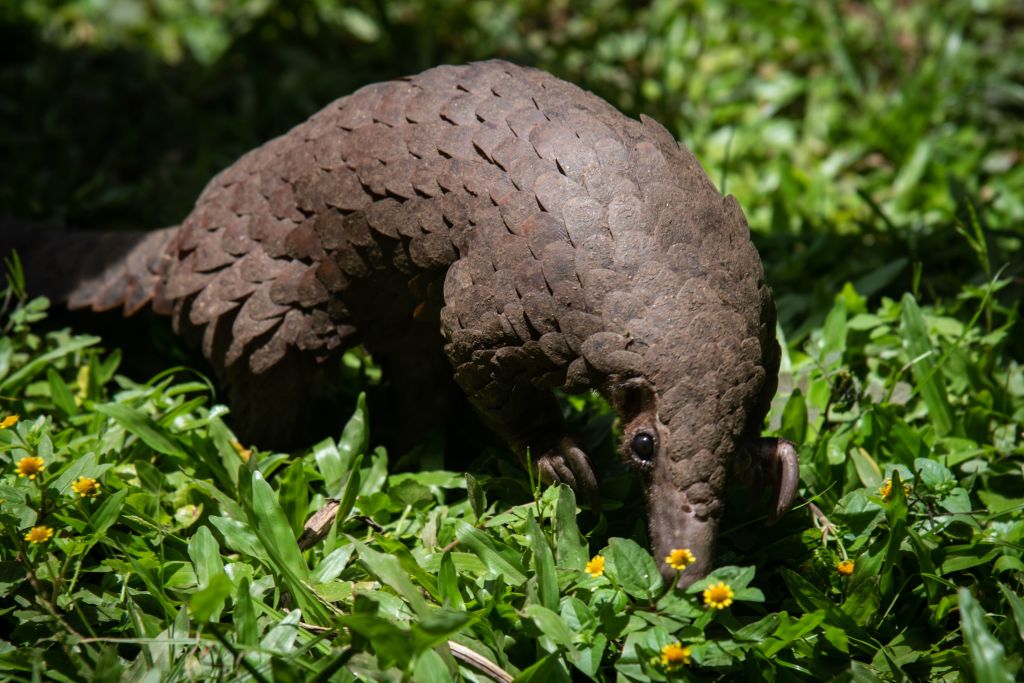ADF STAFF
In the video call, smuggler Phan Quan made it clear: He needed 20 metric tons of pangolin scales shipped to him in Vietnam. The authorities had seized his previous shipment.
Unknown to him, Phan Quan was speaking with an undercover agent working with the Wildlife Justice Commission, a nongovernmental organization created in 2015 to disrupt criminal networks profiting from wildlife trafficking.
The commission alerted the Nigeria Customs Service, which swooped down on Phan and his associates. Along with Phan, the sting also caught his boss, Phan Chi; another Vietnamese smuggler named Duong Thang; and Morybinet Berete, a Guinean smuggler based in Nigeria. The men eventually pleaded guilty and were sentenced to six years in prison.
Pangolin scales are no longer included in the official recipes for Traditional Chinese Medicine (TCM) formulations, but that has done little to stop the illicit trafficking of those and other animal parts among African countries through Vietnam to China for the benefit of the $100 billion TCM industry.
Pangolins, also known as scaly anteaters, are mammals with thick scales made of keratin, the same substance in hair and fingernails. The scales have no medicinal properties.
Despite the official ban on using pangolin scales in TCM, many practitioners continue to do so, making pangolins the most heavily trafficked animals in the world. All eight species of pangolins — four in Africa and four in Asia — are in decline because of the Chinese demand for their scales.
In recent years, China has begun promoting TCM in African countries, which can only increase the demand for the scales.
Asian pangolins are listed as critically endangered. African pangolins are classified as vulnerable. South African authorities have raised concerns that pangolins face extinction in Africa as the TCM market demand increases trafficking in their scales.
Nigeria has become a hub of pangolin scale smuggling over the past decade. Between 2010 and 2021, Nigerian authorities intercepted more than 190,400 kilograms of scales representing nearly 1 million animals, according to researchers from the University of Cambridge.
Chinese and Vietnamese smugglers often rely on African middlemen like Berete to consolidate the products of local poachers. African pangolin scales are then passed off as coming from Asian pangolins, which remain legal in TCM.
Authorities raided Berete’s compound in 2021 and found 7,000 kilograms of pangolin scales.
According to Alexia Tata, a researcher from Cameroon, the poaching driven by China’s demand for pangolin scales and other animal parts increases insecurity for the communities living near the parks and reserves where the poaching often happens.
Cameroon’s port of Douala is another conduit for smuggled animal parts from the Central African Republic, the Democratic Republic of the Congo and the Republic of Congo. In some cases, corrupt military and police officers participate in the trafficking, according to Tata.
“Corruption facilitates trafficking and trafficking incentivizes corruption,” Tata recently wrote for the U.S. Institute of Peace. “More attention is needed on those orchestrating the larger deals and running these transnational networks. These include the elite sponsors of trafficking, who are not always the most visible in everyday trafficking but are among the most influential.”
In most cases, local poachers feel the weight of the law while ringleaders go unpunished. Steve Carmody, lead investigator for the Wildlife Justice Commission, told the BBC that the convictions of the Vietnamese smugglers resulting from commission’s sting are ground-breaking.
“I can’t underestimate the value of this trial,” Carmody said. “These guys are the top of the pyramid.”

